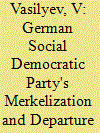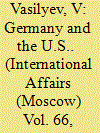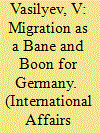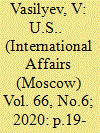|
|
|
Sort Order |
|
|
|
Items / Page
|
|
|
|
|
|
|
| Srl | Item |
| 1 |
ID:
163623


|
|
|
| 2 |
ID:
173291


|
|
|
|
|
| Summary/Abstract |
DONALD TRUMP'S TENURE as U.S. president has shaken the Germans' trust in the United States as guarantor of their security and well-being. They are going through a painful and complicated process of trying to comprehend the United States' policy of economic protectionism, its diplomacy of sanctions, and its demands that European nations raise their contributions to NATO's budget to 2% of their gross domestic product (GDP).
|
|
|
|
|
|
|
|
|
|
|
|
|
|
|
|
| 3 |
ID:
146305


|
|
|
|
|
| Summary/Abstract |
THE MASSIVE FLOW of refugees and migrants into Europe is a problem of political, humanitarian, social, demographical, and economic dimensions. How did Germany come to be seen as the Promised Land by the majority of migrants? History provides answers. First of all, there was postwar resettlement of ethnic Germans ousted from East Prussia, with 7.8 million moving to West Germany and 2.9 million to East Germany in the 1950s. Then, between 1955 and 1973, West Germany's "economic miracle" produced tremendous demand for low-skilled labor. To attract guest workers, West Germany signed agreements with Spain and Greece in 1960, Turkey in 1961, Morocco in 1963, Portugal in 1964, Tunisia in 1965, and Yugoslavia in 1968. Guest workers from those countries made a tangible contribution to West German prosperity. The oil crisis of 1973 forced West Germany to slash its imports of labor. While 870,000 guest workers arrived in Germany in 1973, only 370,000 did in 1975. Economists labeled this a "consolidation phase."
|
|
|
|
|
|
|
|
|
|
|
|
|
|
|
|
| 4 |
ID:
152670


|
|
|
|
|
| Summary/Abstract |
MORE THAN 26 YEARS have passed since the reunification of Germany, and this is a good reason to assess how much the country has increased its economic power and raised its status as a European and global political player. Naturally, studies and debates normally focus on the social and economic perceptions of citizens of united Germany, on negative trends, on risks and challenges facing the country's political class and electorate, and on suggested mechanisms for dealing with problems. Analyses of the path traversed by Russian-German relations since Germany again became a single state chiefly have the goals of finding a solution to the crisis that they are in today, salvaging positive experience that has been accumulated and detecting sore points.
|
|
|
|
|
|
|
|
|
|
|
|
|
|
|
|
| 5 |
ID:
177524


|
|
|
|
|
| Summary/Abstract |
IN EARLY JUNE 2020, The National Bureau of Economic Research (New York), which is responsible for monitoring developmental cycles in the American economy, made the announcement that February 2020 had marked a peak in the American economy's latest climb, which began in June 2009 and continued for more than 10.5 years (128 months). This stretch of the American economy's growth has been the longest since such cycles started being observed and studied in 1854 [1]. Then, beginning in March 2020, primarily as a result of the coronavirus epidemic, the U.S. economy began a precipitous slide into economic crisis. And the first outcomes of the American economy's slide to the bottom immediately brought to mind the Great Depression of 1929-1939, because such indicators have not been marked since the end of World War II in the mid-1940s.
|
|
|
|
|
|
|
|
|
|
|
|
|
|
|
|
|
|
|
|
|